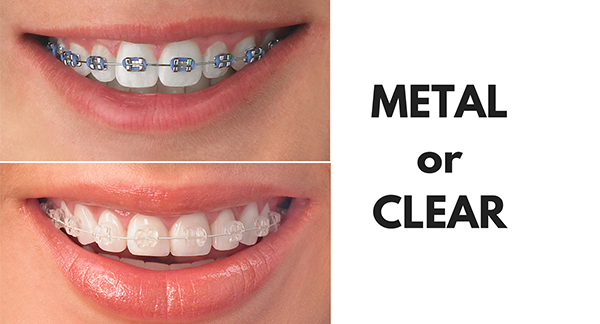Normanhurst NSW 2076, Australia
After hours (Available by Appointment)

Braces are your definitive one-way ticket to a beautiful new smile! With today’s technology, the traditional and prominent metal bracket is not the only option, with fancier and almost invisible options like ceramics and clear path aligners.
Well, obviously, they leave you with a more attractive and confident smile that can add a touch of charm and charisma to anybody!
Braces can also solve orthodontic problems including:
Solving these problems with braces can also lead to better and easier maintenance of dental health. For example, food can become lodged between crowded teeth that may overlap, making them difficult to clean. This can lead to tooth decay.
Crowded teeth and incorrect jaw positions may also lead to certain speech problems as they may make certain sounds and pronunciations difficult.
1. Metal braces
These are the traditional braces that most people think of when given the word braces. They are the least expensive type of braces with brackets made of metal.
2. Ceramic braces
These have the same size and shape as metal braces but are less noticeable as they have tooth-coloured or clear brackets. However, they are more expensive than traditional brackets and can stain.
3. Lingual Braces
Lingual braces have the metal brackets and wires placed on the inside of the teeth, making them invisible on the outside. However, they are difficult to clean, more expensive and are generally more difficult to manage.
4. Clear path aligners
These consist of a series of 18-30 custom-made clear plastic aligners that fit over your teeth in order to move them. They are removable, meaning the patient does not have to restrict their diet from hard foods. However, they are not available for children, are more expensive than other options and take longer.
While patients of any age with orthodontic problems will benefit from orthodontic treatment, the ideal placement of braces when concerning your children is between 10 and 14 years. During this period, the head and mouth are still growing meaning the teeth are more susceptible to the straightening process, resulting in a faster process.
Most types of braces use brackets which are attached to the surface of your tooth using cement bonding glue. A wire known as the arch wire passes through each of the brackets. This wire applies pressure to your teeth via the brackets, causing your teeth and jaw to respond to the pressure by moving. Once the teeth have adapted to the pressure applied by the wire your teeth are ready to move onto the next stage! The orthodontist will replace and ‘tighten’ the wire to make it heavier so that the wire applies pressure again.
Exercising extra care is extremely important once you get braces in order to maintain your dental health. Braces have many tiny spaces that can trap food, leading to the build-up of plaque which can lead to countless other dental problems.
By taking care of your teeth, you will also spend less time in braces and avoid unattractive staining on your teeth.
The brushing process may become a more tedious process while you have braces. Use a gentle circular motion with gentle pressure to clean all surfaces of the tooth, bracket and wire. Rinse your mouth thoroughly or brush your teeth after every meal.
Flossing your teeth normally will be difficult with the wire so buy a flossing device designed for braces, such as a floss threader.
Don’t worry, the actual process of gluing the brackets to your teeth and attaching the wire for the first time does not hurt.
However, once your teeth start to move, there will indeed be pain as the teeth will be very tender and susceptible to pressure. The pain will slowly subside after about a week as your teeth become accustomed to the wire and movement.
This pain and tenderness will come back each time you get your wires tightened. Luckily, the subsequent wires and their tightening will generally be much less painful than the first as your teeth will get accustomed to the pressure quicker.
If you have any concerns about how your Smile, talk to the clinicians at Normanhurst Dental. They can check your teeth and advise on the best options available to improve your smile.
For any other queries contact us at www.normanhurstdental.com.au or call us on 02-99898565